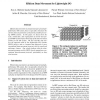Free Online Productivity Tools
i2Speak
i2Symbol
i2OCR
iTex2Img
iWeb2Print
iWeb2Shot
i2Type
iPdf2Split
iPdf2Merge
i2Bopomofo
i2Arabic
i2Style
i2Image
i2PDF
iLatex2Rtf
Sci2ools
CLUSTER
2006
IEEE
2006
IEEE
Efficient Data-Movement for Lightweight I/O
Efficient data movement is an important part of any highperformance I/O system, but it is especially critical for the current and next-generation of massively parallel processing (MPP) systems. In this paper, we discuss how the scale, architecture, and organization of current and proposed MPP systems impact the design of the data-movement scheme for the I/O system. We also describe and analyze the approach used by the Lightweight File Systems (LWFS) project, and we compare that approach to more conventional data-movement protocols used by small and mid-range clusters. Our results indicate that the datamovement strategy used by LWFS clearly outperforms conventional data-movement protocols, particularly as data sizes increase.
CLUSTER 2006 | Conventional Data-movement Protocols | Distributed And Parallel Computing | Efficient Data Movement | I/o System |
| Added | 20 Aug 2010 |
| Updated | 20 Aug 2010 |
| Type | Conference |
| Year | 2006 |
| Where | CLUSTER |
| Authors | Ron Oldfield, Patrick Widener, Arthur B. Maccabe, Lee Ward, Todd Kordenbrock |
Comments (0)

